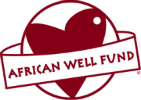Following the completion of our first
project in Ghana in 2008, African Well Fund was lucky enough to
continue work in the same region in 2009. This continuing work aimed
at offering assistance to communities not targeted by the first phase
of the Water for Cocoa Farmers initiative. These farmers expressed
many of the same needs as those addressed by the original project.
Agave’s previous source of water.
Like other Ghanaian farmers, community
members had to contend with unreliable water sources, leading to
disease and additional economic hardship, with women and children
having to spend hours every day looking for water, rather than
engaging in other activities such as school or farming.
In addition, the lack of sanitation
options available in the Wassa Amenfi West District, particularly in
schools was a serious area of concern. Throughout the District, only
three out of over 300 schools have toilet facilities on campus. The
facilities which are available are unsuitable for children. Many
consist of only a hand-dug pit covered by planks, into which children
often fall. Lack of privacy caused still more problems, discouraging
girls in particular from continuing with their studies.
The end result is a high rate of
water-borne disease, as well as decreased economic productivity among
farmers.
The pit which community members in Sabena used before the new KVIP latrine was built. Before construction, a young boy fell in.
In partnership with Africare and Mars,
Incorporated, the ‘Water for Cocoa Farmers Phase II’ initiative
brought potable water, toilets, and water and sanitation management
training to eight communities in the Wassa Amenfi West District.
Wells were constructed in Bokakore, Serwayo, Agave, and Ayitey
Doriyem. Latrines were constructed at Nkwantanum, at a health clinic
which worked for four other communities, and at a school in Sabena.
Overall, over 5,000 community members were served through the
project.




